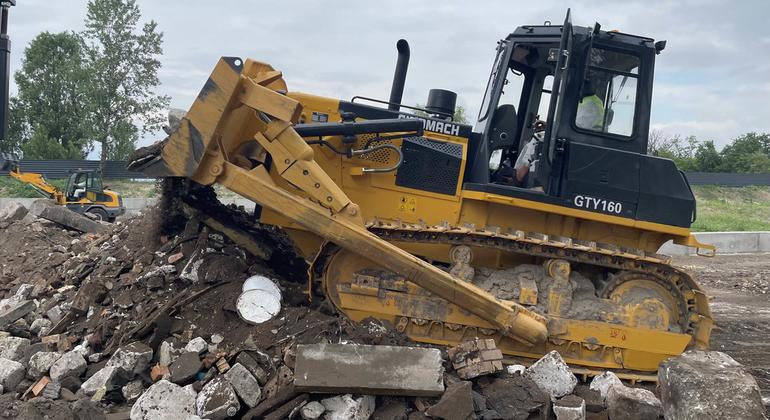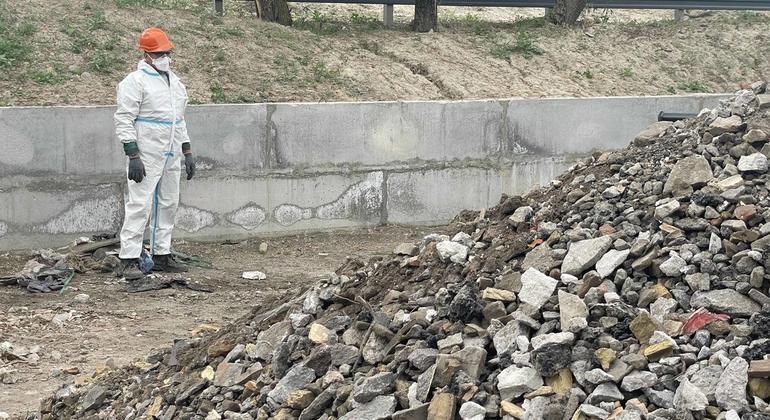
The UN Development Program in Ukraine has been clearing the rubble of destroyed buildings for two years now. The UN opened an innovative station for processing war waste in Ukraine Peace and Security
According to the State Emergency Service of Ukraine, 26 percent of the country’s territory was affected by military operations. Large-scale destruction and, as a result, thousands of tons of waste is a huge problem that will take decades to solve. In most communities, they do not know how to sort this waste, and instead of organized sites for storing waste, spontaneous landfills appear.
The UN Development Program in Ukraine has been clearing out the rubble of destroyed buildings for two years now and is introducing an entire waste management system. Recently, an innovative station was opened in the Kyiv region for processing waste that has accumulated in the Buchan community. UNDP helped organize the work of the station with the support of the European Union – they supplied equipment and trained staff. The city leadership, in turn, allocated a four-hectare plot of land to organize the station. This is the first UN project of this kind in Ukraine; there are plans to introduce such a waste recycling system in other regions of the country.
Thousands of houses damaged
“Ukraine had never seen such a scale of destruction before, so there was no need for the ability to handle such waste, there was no system,” says Roman Shakhmatenko, a specialist at the UN Development Program. – This landfill was formed immediately after the de-occupation of the Kyiv region. The destruction waste was not initially sorted here – then it was necessary to clear the populated areas as quickly as possible so that people would start returning. Now we need to do something about it. In general, the problem today in the Kyiv region is very big – thousands of houses have been damaged.”
This is confirmed by the mayor of Bucha, Anatoly Fedoruk: “When they talk about restoration, you need to understand that before you start building, you need to dismantle and remove what was destroyed. In the Buchansk community, as a result of the full-scale Russian invasion, more than four thousand objects, including high-rise apartment buildings, were damaged. At the first stage, more than 500 private houses destroyed as a result of hostilities were dismantled and removed. I remember that large dump of equipment, cars (of which there were more than 200) – there for a long time no decision was made about proper disposal. Then people began to return and take all their household garbage there, and this became a huge problem – a spontaneous landfill formed. And thanks to the first UNDP private sector cleanup program, we were able to clean up the area. Currently, the volume that we need to process is still very large. We have accumulated 75 thousand cubic meters of destruction waste – we need to sort it all, process it and recycle it. And those residues that cannot be recycled must be disposed of according to European standards. This is a complex process, but we plan to completely organize all landfills by the end of this year. This is actually the first such pilot project not only in the Kyiv region, but also in all de-occupied territories in Ukraine.”
Innovation station in Bucha
“The heart of this process is a mobile crusher that processes waste so that it can be reused later, for example, in new construction,” says UNDP specialist Roman Shakhmatenko. – This machine can process 80 cubic meters of waste per hour. For example, one large truck is 15 cubic meters, that is, the crusher processes five such vehicles per hour. This will be sufficient for the needs of the region. We are not just a donor, but a full-fledged partner of the project. In addition to supplying equipment – crushers, machines, excavators – we also help train utility company employees. People must be able to work with explosive objects, which are now often found in the waste of destruction.”

From left to right: Mayor of Irpen Anatoly Fedoruk, head of Buchaservice Sergei Mostipaka, UNDP specialist Roman Shakhmatenko, UNDP specialist Anastasia Shapran.
The station is divided into several locations. “At the first stage, the rubble is cleared. Wood, plastic, glass, and so on are sorted and sorted,” says Sergei Mostipaka, head of the Buchaservice utility company. “What is already being transported to the second location is what is further processed by a crusher – it can crush concrete and brick into different fractions – from the largest to the smallest. That is, in fact, this is an almost waste-free production – waste is taken to a landfill, sorted, processed and reused. Only waste containing asbestos cannot be recycled and disposed of.”
Asbestos is a huge problem
“A special laboratory will be installed at the processing station in Bucha to detect asbestos – in the waste itself and in the air in the work area,” says a UNDP specialist. – This is a mandatory requirement by all international standards. Asbestos is dangerous to human health – it causes lung disease, which can occur in a day or a week or after 20 years. This is the sleeping killer. Therefore, it is important to know that there is no asbestos in both the waste that is then reused and in the area where people work. In general, asbestos is a separate huge problem. We have a lot of it – these are slate roofs of houses and various insulation materials. All over the world, this problem began to be solved back in the 70s, and it was very expensive. We have only just started working on this. New production of asbestos is prohibited, but what to do with the waste is a very difficult question. We need special places for its burial and separate technologies for handling it. For ourselves, we have already developed appropriate protocols for dealing with asbestos – we pack it and take it out for temporary storage in specially designated places, where it will remain until special places for its disposal become available.”

Explosive objects
“Before we take a step into any territory that was occupied, we conduct demining,” says Bucha Mayor Anatoly Fedoruk. “I will not exaggerate if I say that where the Russian army was, all the territories need a professional survey by sappers – there are many “surprises”. This is a very complex and lengthy process. For example, we worked with our partners for three weeks on a 2.5-hectare territory that will later be used as a construction site for a hospital. The same “surprises” are encountered during the sorting of waste from destruction. A month ago, we began manually sorting out the waste that was taken here. Unfortunately, we find remnants of what the Russian military left behind – various explosive objects. Attention is very important.”
“Scary Surprises”
“There are other terrible “surprises,” says Roman Shakhmatenko. “While clearing out the rubble, we recently found the corpse of a man with his eyes and hands blindfolded. This happened when we were dismantling one of the houses in Bucha. All that’s left of the body is practically a mummy.” are considered missing. We know that some of them are in Russian captivity, but where the rest are is unknown. This example makes us understand that we will be able to find some of the missing people while clearing the rubble.”

UN system support
“I want to say that many different international missions visit Ukraine, but they work more for their personal image, and that’s all the help ends,” says Anatoly Fedoruk. – Regarding cooperation with the UN, with the mission that works in Ukraine, I can confidently say that this is one of the few professional systematic approaches that gives us the opportunity to feel a real partnership. We receive systematic help and support.”
“The equipment that the Buchi utility company had was almost all destroyed as a result of the Russian invasion,” says Sergei Mostipaka. – Therefore, the work of the enterprise now had to be organized practically from scratch. This project with UNDP actually gave a second life to our utility company. “Buchaservice” is engaged in the maintenance of apartment buildings, road surfaces, sidewalks, lighting and even cemeteries. Garbage removal in 12 settlements of the region is also one of our main tasks. We have operators who can work on new equipment. Now we even attract girls, since some of the men have left to serve.”

Post-war plans
“The accumulation of garbage occurs constantly – we are talking, for example, about foliage, branches – garbage from entire tracts of forested park areas. This project gives us the opportunity to recycle everything, just as we now recycle waste after destruction. Even during peaceful life, there is always a need to recycle brick, concrete, foam concrete – there is always construction waste, because the city is being built all the time. And here it is important to establish a service – so that everyone knows that there is a location where you can always bring garbage, and here it will always be accepted, selected, sorted, processed and properly disposed of,” Fedoruk is sure. – It was no coincidence that UNDP chose our municipal enterprise Buchaservice, because even before the war we tried to handle waste properly – we were engaged in sorting. The waste recycling program that we are currently implementing together with UNDP is a second life for our enterprise. They not only help us cope with all the rubble and waste from destruction, but also help us develop the utility company itself according to European standards. I think, thanks to this support, by the end of this year all the rubble will be localized in the Buchan community.”

Volumes of rubble
UNDP plans to establish a similar waste recycling process in other regions of Ukraine: “We are clearing out rubble not only in the Kyiv region, but also in the Chernihiv region, and in Kharkov we are currently dismantling multi-storey buildings. It is very important for us that this is not just cleaning, but a full cycle – that this garbage is recycled and reused. The volume of rubble in Ukraine is so great that no one can now name the exact number of tons of such garbage. We understand that this is a problem for years to come. And if we can solve it the way it is now organized in Bucha, it will be very good. However, we must remember that 60 percent of the work in this case was done by local authorities and the utility company, and UNDP helped. A lot depends on local leaders.”
Read also:
“We need everything, from toothbrushes to clothes”: stories of evacuated residents of the Kharkov region
The situation in Kharkov
“In Kharkov, we began work on dismantling apartment buildings,” says a UNDP specialist. – Local authorities cannot physically cope with this problem on their own – this is a very difficult task, both legally and technically: if a private house is dismantled in two to three days, then a high-rise building needs about three weeks. It all depends on the circumstances and conditions in which this is done. Many of the damaged houses are in the Saltovka area, which is constantly attacked by Russia. Now we have cleaned, sorted and removed one apartment building there, and by the end of the year we plan to dismantle 12 high-rise buildings in Kharkov.”
Reusing waste
Basically, recycled demolition waste can be reused in construction. “The standards that apply to building materials are quite strict – you won’t throw anything into concrete, just mix it if it doesn’t work,” says Roman Shakhmatenko. – Therefore, in addition to the fact that we are engaged in sorting and recycling waste, we want to create a catalog of technologies for reusing materials for the Ministry of Infrastructure of Ukraine. Our main task for the future is to turn waste into resources.”
